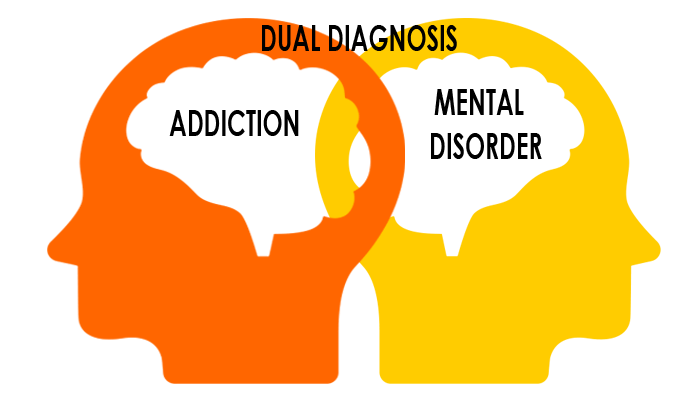Dual Diagnosis Treatment
Dual Diagnosis
We provide Dual Diagnosis Treatment for co-occurring disorders of mental health and addiction in Agoura Hills, California and the surrounding areas, including Thousand Oaks, Woodland Hills, Calabasas, Westlake Village, Sherman Oaks, Studio City, Tarzana, Encino, Oxnard, Ventura, and Santa Barbara.

What is Dual Diagnosis?
Dual Diagnosis refers to the combination of a mood disorder along with an addiction to drugs or alcohol. The phrase “co-occurring disorders” is often used, as well, because both illnesses exist at the same time and frequently aggravate the symptoms of the other condition.
Establishing which disorder came first is difficult. Addiction to alcohol or drugs alters the brain’s chemistry. This can result in behaviors that might bring about mood disorders, such as depression or anxiety. However, an untreated and pre-existing mental condition, like bipolar disorder, can drive a person to self-medicate using either drugs or alcohol or both.
The key to treating those suffering with a dual diagnosis is identifying and evaluating both disorders. Long-term recovery is unlikely if only one of these serious conditions is addressed.
Our staff is nationally recognized for their expertise in the areas of addiction medicine, psychopharmacology, and for groundbreaking work in treating individuals with a dual diagnosis.
Depression Treatment
There are approximately 19 million Americans dealing with depression. Magnetic resonance imaging (MRI) reveals that the brain of someone suffering from depression appears different than the brain of someone without the disorder.
The ultimate cause of depression is not entirely understood. Most studies point to a combination of genetic and environmental factors. Some of the symptoms of depression are:
- Feelings of guilt, helplessness and irritability
- Trouble sleeping combined with decreased energy and exhaustion
- Loss of libido
- Changes in appetite
- Difficulty making decisions and concentrating
- Suicidal thoughts and tendencies
There have been many advances made in the treatment of depression. Those experiencing this mental disorder can and do recover with the appropriate care. Our program has been successfully treating patients with depressive disorders for more than a decade.
After a thorough medical and psychiatric evaluation, the proper medications and therapies can be applied, which help to alleviate the painful symptoms, and this treatment is offered in an outpatient setting.
Bipolar Treatment
Typically, bipolar disorder develops in a person’s late teens or early adulthood. This condition is characterized by mood swings that run from the most severe depression to states of intense mania. In extreme cases of bipolar disorder, symptoms of mania and depression can exist at the same time.
The National Institute of Mental Health estimates that 2.6 percent of the U.S. population is affected every year by bipolar disorder. Research into this condition suggests that there is no single cause for the disease, but experts believe the condition is hereditary. The symptoms of bipolar disorder are complex and can vary from person to person. A few common symptoms are:
- Long periods of worry and feelings of emptiness
- Long periods of being overly happy, outgoing, feeling wired or irritable
- Talking very fast and being easily distracted
- An unrealistic belief in one’s own abilities
- Feeling tired and slowed down
Without treatment, bipolar disorder is very difficult to live with. The extreme shifts in mood can damage a person’s private and professional life. Additionally, a very high percentage of people with bipolar disorder suffer from substance abuse issues.
Bipolar treatment begins with a proper diagnosis by a qualified physician. Our experience has shown that not every patient suffering with bipolar disorder responds to the same medication. Only after a comprehensive evaluation, which takes into account a patient’s unique needs and issues, can the proper therapy be given along with the appropriate mood stabilizing medications.
Our outpatient detox program is one of the few places in the country that provides expert bipolar treatment and care as an outpatient service.
Anxiety Treatment
Anxiety disorders, such as post-traumatic stress disorder, panic disorder and obsessive-compulsive disorder, are among the most common mental conditions in the U.S. Those living with excessive anxiety can experience painful episodes lasting as long six months. These episodes can paralyze people and disrupt their lives and the lives of their families.
There are several different types of anxiety disorders, and the symptoms vary depending on the specific condition. Some of the overlapping and common signs of this mental illness are:
- Uncontrollable or racing thoughts
- Insomnia
- Feelings of uneasiness, fear and panic
- Obsessive behavior
- Shortness of breath
- Heart palpitations
As with other mood disorders, people with anxiety conditions have a high likelihood of co-occurring substance abuse issues. A medical doctor must diagnose anxiety disorders, and experts in the fields of psychopharmacology and psychiatry should administer anxiety treatment. The right medications can aid patients in controlling their levels of anxiety while the proper therapy can help them develop skills and techniques to live normal and happy lives.